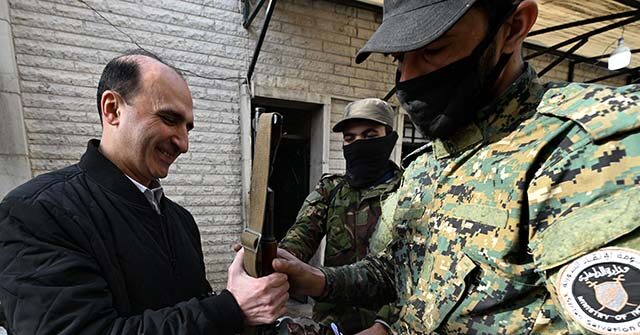We support our Publishers and Content Creators. You can view this story on their website by CLICKING HERE.

The Syrian Democratic Forces (SDF), a Kurdish-led militia in northern Syria that played an instrumental role in toppling the Islamic State “caliphate,” said on Thursday that it was preparing to send a delegation to the Sunni jihadis of Hayat Tahrir al-Sham (HTS), the group currently in charge of the country.
HTS is an offshoot of al-Qaeda run by Abu Mohammed al-Jolani, who formerly worked under ISIS “caliph” Abu Bakr al-Baghdadi. The group is a U.S.-designated foreign terrorist organization and Washington is currently offering $10 million for information leading to Jolani’s arrest. HTS became the de-facto government of Syria on Saturday when its fighters marched into Damascus, prompting longtime dictator Bashar Assad to flee the country. The Kremlin ultimately confirmed that Assad landed in Russia, where strongman and longtime patron Vladimir Putin granted him political asylum.
The HTS campaign that began in November with the capture of Aleppo from Assad forces concluded an over decade-old civil war that at one point featured as many as ten different combatant forces and state actors. It did not result in the end of conflict, however, as in Syria’s north, far from HTS areas, the SDF became the target of an operation by Syrian National Army (SNA), a Sunni Islamist militia backed by Turkey. The SNA launched “Dawn of Freedom,” a plan to eradicate the indigenous Kurdish presence of northern Syria, shortly after HTS took Aleppo, and is believed to have displaced as many as 120,000 in the past month.
In the face of this assault – and relative silence from purported allies in Washington – the SDF leadership announced on Thursday it was reaching out to HTS. SDF Commander Mazloum Abdi had clarified last week that it had no quarrel with HTS and no fighting had occurred between his militia and the victorious jihadists.
“At the outset of the incident, HTS informed us that our territories are not their target,” Abdi said on Thursday, speaking to the Kurdish outlet Ronahi TV, according to Rudaw. “We have agreements with HTS regarding Aleppo and Deir ez-Zor.”
Abdi said that the political organizers affiliated with the SDF were preparing a “delegation to Damascus” to keep open contact with HTS. HTS has since appointed Mohammad al-Bashir the “prime minister” of the “transition” out of the Assad regime and promised to build an “inclusive” government, through Jolani himself has insisted that the new government would be Islamist and those concerned about such a development, such as persecuted Christians, were simply ignorant of the positive attributes of political Islam. The majority of Syrian Kurds, while not ethnically Arab, are Sunni Muslims, potentially the reasoning behind HTS assurances they would not target “minorities.”
In addition to planning talks with HTS, Kurds in Syrian Kurdistan (Rojava) raised the Syrian rebel flag in their territories on Thursday as a gesture of peace with the new regime.
“On the occasion of the victory of the Syrian people’s will and the overthrow of the repressive regime, the Democratic Peoples’ Council has decided to raise the flag of independence,” an official statement from Kurdish political leaders read. While the SDF and the Assad regime had few clashes during the civil war, as both were preoccupied fighting other factions, some Kurdish observers celebrated the fall of the “Syrian Arab Republic” and hoped it would be replaced with a nation inclusive of Kurds.
While efforts to build trust between the SDF and HTS are underway, Abdi, the SDF commander, warned on Wednesday that the SDF’s joint operations with America to contain Islamic State elements in the country are currently not operational, a product of the Turkish proxy attacks.
“ISIS is now stronger in the Syrian desert. Previously, they were in remote areas and hiding, but now they have greater freedom of movement since they face no issues with other groups and are not engaged in conflict with them,” Abdi said in an interview with the British broadcaster Sky News. “In the areas under our control, their activities have also increased. Just a few days ago, three members of the Internal Security Forces were killed near al Hassakah in an ISIS operation.”
Abdi also said that the security of prisons holding ISIS terrorists in the region, currently controlled by the SDF, was in jeopardy: “Frankly, there is currently a significant threat to the security of these detention centres.”
The Turkish-backed “Dawn of Freedom” resulted in mass attacks on the SDF throughout their areas in the north. In the city of Shahba, local authorities report tens of thousands of Kurdish civilians expelled from their homes, pressuring the already impoverished communities in some war-torn areas of northern Syria. Sheikhmous Ahmed, a local Kurdish official, told Rudaw that at least 120,000 people fled the city, though the number is likely much higher because “many have not been registered.”
HTS and the SNA have traditionally competed for resources as fellow Sunni Arab jihadist organizations and failed to build any significant positive relationship. No reports at press time indicate that they are in conflict, but some observers expect HTS to move to assert control over SNA areas and return them to Syrian control, preventing the expansion of Turkish influence.

 Conservative
Conservative  Search
Search Trending
Trending Current News
Current News 






